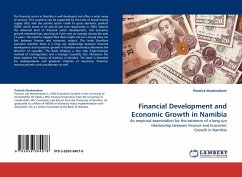The major focus of this book is to analyze the impact of bank-based measures of financial sector development on economic growth in Zimbabwe using the error correction econometric methodology. Empirical analysis revealed that bank-based measures of financial sector development employed significantly impact on economic growth in Zimbabwe. The main conclusion in the book is that, for the period of analysis, the ratio of private credit to total credit had a positive and significant impact on economic growth at 5% while the ratio of total bank credit to GDP was only significant at 10%.The book concludes by recommending that more credit should be channeled to the private sector rather than to the government.However, the book also recommends the importance to monitoring the activities related to public expenditure closely so as to enhance productive investment of the public sector. The book attracts wider interest from Africa and other developing countries.
Bitte wählen Sie Ihr Anliegen aus.
Rechnungen
Retourenschein anfordern
Bestellstatus
Storno








